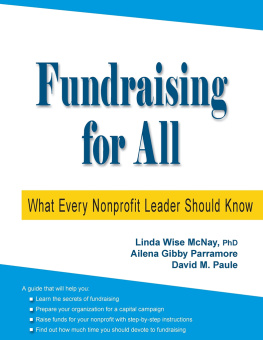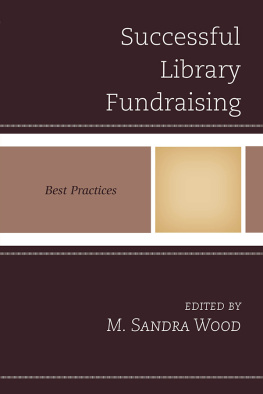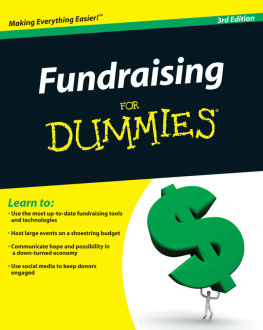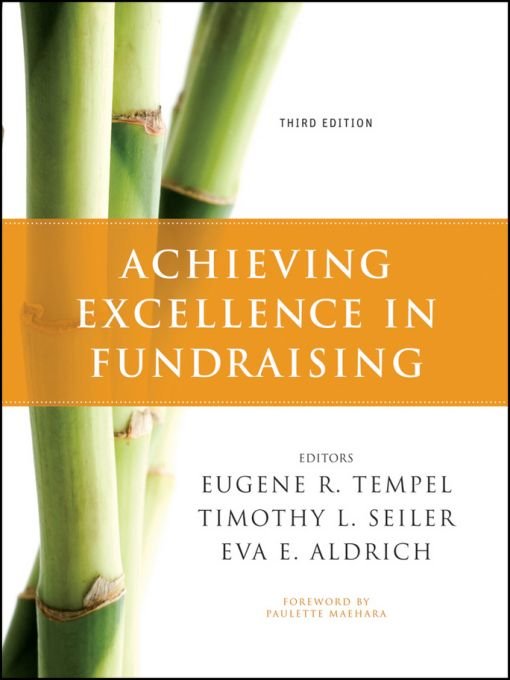Table of Contents
Table of Figures
List of Tables
Table of Exhibits
The third edition of Achieving Excellence in Fundraising is reorganized, contemporized, and amplified by new research. True to the work and spirit of the legendary fundraiser Hank Rosso, this masterwork of fundraising principles and practices deserves a place in every fundraisers library.
Rita Bornstein,
president emerita and Cornell Professor of Philanthropy and Leadership,
Rollins College
For more than 30 years, fundraisers within the not-for-profit sector in New Zealand have been inspired and trained by the practical input and legacy of Henry A. Hank Rosso. This new edition of Achieving Excellence in Fundraising is a valued addition to our ongoing education especially as we aspire to that premier qualification, the CFRE. We welcome and strongly recommend this book to all aspiring fundraisers. Only by practicing the principles and advice within this book can we make that positive difference towards improving the world we share.
James Austin,
CEO, Fundraising Institute of New Zealand (FINZ)
Hank Rossos timeless fundraising lessons not only live on in this latest edition, but they are enhanced with valuable overviews on contemporary topics such as social media and Internet solicitations. Every fundraising manager, and those aspiring to be, should have a copy of this new edition.
Rodney P. Kirsch,
senior vice president for development and alumni relations,
Pennsylvania State University
A comprehensive reference for anyone truly serious about fundraising as a career. The third edition celebrates Hank Rossos legacy with contributions from a plethora of fundraising specialists at the top of their game.
Adrian Sargeant,
Robert F. Hartsook Professor of Fundraising,
Indiana University
This book is a rare example of how tradition can generate innovation by focusing on a holistic approach on fundraising shifting from the description of a set of rules to a path of values where its core is not money, but trust. This is a book not only for fundraisers, but also for all the scholars, practitioners, and students who dedicate their energy and talents to philanthropy. A new professional profile emerges from this wonderful book, which is inspired by a coherent philosophy: the profile of the fundraiser as an organizations development professional, searching for meaning and not only for money.
Giuliana Gemelli,
professor of history of scientific and cultural institutions, and history of philanthropy,
University of Bologna
Essential Texts for Nonprofit and Public Leadership and Management
The Handbook of Nonprofit Governance, by BoardSource
Strategic Planning for Public and Nonprofit Organizations, 3rd edition, by John M. Bryson
The Effective Public Manager, 4th edition, by Steven Cohen et al.
Handbook of Human Resources Management in Government, 3rd edition, by Stephen E. Condrey (Ed.)
The Responsible Administrator, 5th edition, by Terry L. Cooper
Conducting a Successful Capital Campaign, revised and expanded edition, by Kent E. Dove
The Public Relations Handbook for Nonprofits, by Arthur Feinglass
The Jossey-Bass Handbook of Nonprofit Leadership and Management, 3rd edition, by David O. Renz, Robert D. Herman, & Associates (Eds.)
Benchmarking in the Public and Nonprofit Sectors, 2nd edition, by Patricia Keehley et al.
Museum Marketing and Strategy, 2nd edition, by Neil Kotler et al.
The Ethics Challenge in Public Service, 2nd edition, by Carol W. Lewis et al.
Leading Across Boundaries, by Russell M. Linden
Designing and Planning Programs for Nonprofit and Government Organizations, by Edward J. Pawlak
Measuring Performance in Public and Nonprofit Organizations, by Theodore H. Poister
Human Resources Management for Public and Nonprofit Organizations: A StrategicApproach, 3rd edition, by Joan E. Pynes
Understanding and Managing Public Organizations, 4th edition, by Hal G. Rainey
Designing and Conducting Survey Research, 3rd edition, by Louis M. Rea et al.
Fundraising Principles and Practice, by Adrian Sargeant, Jen Shang, & Associates
Making Critical Decisions, by Roberta M. Snow et al.
Handbook of Practical Program Evaluation, 3rd edition, by Joseph S. Wholey, Harry P. Hatry, & Kathryn E. Newcomer (Eds.)
The Instructors Guide for the third edition of Achieving Excellence in Fundraising includes syllabi and supporting materials for semester-long undergraduate and semester-long graduate versions of the course. The Instructors Guide is available free online. If you would like to download and print a copy of the guide, please visit: www.wiley.com/college/tempel
For practitioner audiences, a six-unit continuing education format suitable for self-directed study groups seeking an intensive review of fundraising best practices is available from The Fund Raising School at: www.philanthropy.iupui.edu/TheFundRaisingSchool
The Center on Philanthropy at Indiana University increases the understanding of philanthropy and improves its practice worldwide. The Center on Philanthropy also fosters relationships in the growing field of philanthropic and nonprofit studies. Through research, teaching, professional development and training, and public service and public affairs initiatives, the Center on Philanthropy is increasing knowledge about philanthropy and helping to develop the next generation of nonprofit professionals, scholars, volunteers, and philanthropists.
Founded in 1987, the Center on Philanthropy pioneered the field of Philanthropic Studies, a unique, interdisciplinary approach to studying philanthropy through the lens of the liberal arts that also incorporates the expertise of professional schools, including public affairs, business, law, education, social work, medicine and nursing. Today, more than sixty philanthropic studies faculty members in seventeen disciplines conduct research and teach philanthropy and nonprofit management.
The Center on Philanthropy at Indiana University conducts basic and applied research and seeks to build a closer relationship between research and professional practice in the nonprofit sector. The idea that university research and information on best practices informs and strengthens the work of nonprofit professionals and that the experience of professional practice informs research is one of the core principles that led to the creation of the Center on Philanthropy and remains a hallmark of its work today.
More than fifteen graduate, undergraduate, and doctoral-level academic program options available through the Center on Philanthropy, including online and executive courses, help students to learn both the how to and the why of nonprofit management and philanthropy. The Centers programs encourage mid-career students and those new to the field to become reflective professionals who understand and consider the cultural, economic, historical, and social context and implications of the work they do and help them enhance their skills through critiquing, teaching, and reinforcing philanthropys values.







